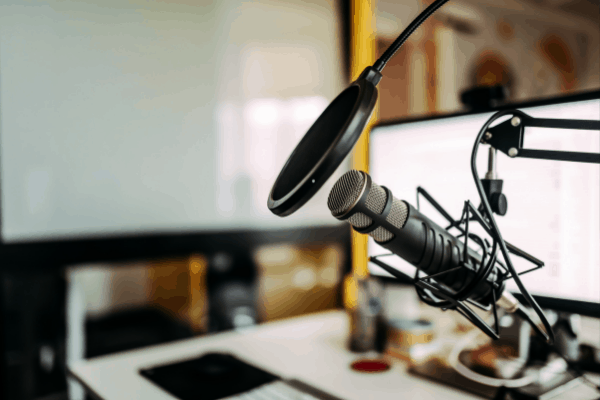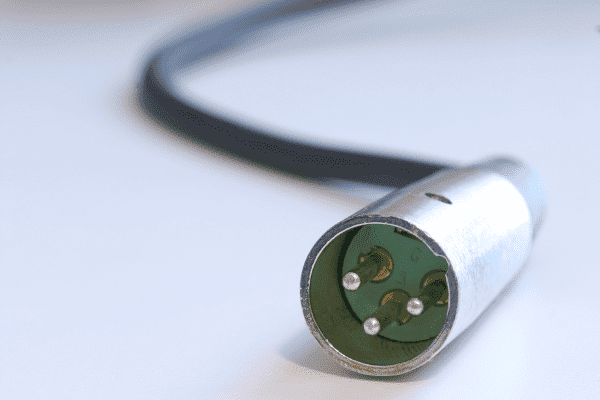Buzzing or static noises are irritating and bothersome to listen to. And it can be very frustrating if you have set up your microphone for a recording or for a live event only to hear this unwanted sound crackling mercilessly through your audio connection or your speakers. What causes this white noise and how do you get rid of it?
But what causes this static? and how do you get rid of mic static? Your mic may have static because its gain may be set too high on your audio interface or amplifier, caused by bad cable connection, ambient sounds, or interference, or your recording software. Knowing the exact cause of the static is the key to fixing it.
In this article, we will talk about the various reasons why microphones emit a buzzing or static noise and how to get rid of the static in each scenario.

Mic and Audio Settings Need Adjustment
In many cases, the static noise produced by your microphone is caused by the gain, which may be set too high on your audio interface or your amplifier. If this is the case, you may hear some buzzing sound or electronic noise. Even more so if your mic is very sensitive.
As a rule of thumb, remember that the higher the gain, the louder your mic’s output volume is. So if the gain has been set too high, the more likely your mic is going to pick up background noise then amplify this noise into static.
Moreover, keep in mind that different microphones have different sensitivity levels, some of them being way more sensitive than others. For example, condenser mics generally have a higher sensitivity than dynamic mics.
So even if you expose these mics to the same sound source, they would produce different levels of audio output. As such, a mic with a high sensitivity level would naturally require less preamp gain. So you can just imagine how noisy it could get if the gain is too high.
Solution: Lower Gain on Your Audio Interface, Amp, or Mic
There is no universal setting for gain since not all microphones are the same in terms of sensitivity. So you will need to lower the gain slowly and check the static as you go along.
To get rid of the static in this particular case, you need to find the “input” or “gain” knob on your interface, amplifier, or on the mic itself. Turn the gain down one to two decibels and try talking into the mic to see if it worked. If the static is still there, keep adjusting this knob until it gets to the gain level where you can no longer hear any static noise.
Check out my picklist for the Best Condenser Mics For Less Than $200.
Bad Cable Connection
A cable or jack that is not sitting or plugged correctly in its port can cause static noise. As such, make sure that the jack of your mic has been pushed far enough into the port of your audio interface, amp, or computer. If not, then give it a gentle push to plug it all the way in. Check the cable of your speakers or headphones, too.
If the cable is still loose and it jiggles, then it won’t properly connect to the interface or amp. So, you won’t be able to get rid of the static noise. In this case, you might need to buy a new cable.

Another possibility is you have plugged the microphone jack into the wrong port. If you find it difficult to read and determine which plughole is for which device, use a flashlight and maybe a magnifying lens to make sense of the very tiny icons printed above the plugholes.
It is also worth noting that if your mic has a mini jack, you may get static noise from all over the place because it typically won’t fit tightly into the plughole. A mini jack is also not earthed and therefore picks up static from your electrical equipment, computer, and even your body. So if this is the problem, it is best to get a mic with a USB connection.
A USB connection reduces static considerably since it doesn’t deteriorate as quickly as a mini jack connection.
Check out: Wireless Mic Vs Shotgun Mic: Which Is the Better Type?
Microphone Is Too Close to Speakers, Amps, and Other Electronics
If your microphone is too near your amplifier or speaker, you would hear feedback or a sharp screeching sound. Feedback is caused by the ambient noise that is being projected into the air and which cycles back through your mic.
Occasionally, the high- or low-frequency sounds from your other electronics, like your TV, phone, or other devices, can also cause audio static when your mic is too near.
To fix this, you may want to change where you stand while you speak into your mic. It is recommended that you position your mic at least 10 feet (3 meters) away from your amps, speakers, or other electronic devices, in order to remove this feedback or static noise. You may also want to turn off your mobile phones.
For more information regarding microphone picking up unwanted sounds, check out some of my other articles:
- Prevent Microphones From Echoing Through Speakers
- Decrease Background Noise on a Blue Yeti Mic
- Decrease Background Noise on a Blue Snowball Mic
Ambient Sounds
Ambient sound in the room or studio could cause static noise. So to cut down on static, you may want to soundproof the room by putting soundproofing foam or panels on the walls or covering the walls and floors with carpets, mats, or thick blankets.
You may also want to reduce excess noise by turning off air-conditioning units, fans, or heating vents. These appliances pump air around the house, and sensitive mics could pick up these small sounds caused by the movement of air, which, in turn, would be audible as static sounds.

It would also be a good practice to hold the mic one to three inches (2.5 to 7.6 centimeters) away from your mouth when you record your voice or when you talk or sing. The more space between your mouth and the mic, the higher the chances that your mic will pick up distorted sound present in the air.
As such, try moving the mic closer to your mouth and see if the static noise is gone. Using a pop filter would also help eliminate hissing sounds, which would be too audible when you’re close to the mic.
Using a microphone shock mount will also protect your mic from shocks, vibration, and other background or handling noise.
Check out my guide to the Best Boom Arms.
Audio Programs and Software Used
Running the right programs on your computer while you are recording your voice will also help eliminate the static noise generated by your microphone.
This video talks about using ASIO4ALL, Reaper Plugs VST, and Minihost Modular, in tandem with Voicemeeter, for clear, crisp voice and without the white noise:
The static noise may also have something to do with a faulty setting in the audio recording software application that you are using. The possible problems, however, vary widely, so you will have to go through them, or seek the help of someone who is an expert in that software.
For instance, it could be a compatibility issue in your sound settings, so you may want to go for the “more compatible” option and try that.
You can use noise reduction software if you have already recorded your audio and the noise is there. This kind of software can help remove background noise from your audio signal and isolate the clean audio from it. There are also digital audio workstations that offer a sound restoration feature.
Interference From Electrical Outlets
Electric current in your wall outlet or power source may clash with an electronic component in your microphone that causes static noise. So you might want to check your wall outlet or USB port.
You can turn your microphone off, as well as your speaker, audio interface, and amp, then unplug all their cords from their current wall outlets or USB ports. Plug them into a different set of outlets or ports and turn them on. See if this has eliminated static noise since different outlets generate different electric currents.
Final Thoughts
There are several possible reasons why you experience static noise from your microphone. You can go through them one by one, starting with the simplest solutions, and see if static noise has been eliminated. If none of these things work, you may have to get another microphone that gives you cleaner audio signals.
Source
- Church Sound Tips: How To Reduce Background Noise on a Microphone
- YouTube: Eliminate Microphone STATIC, BUZZING & BACKGROUND NOISE FREE – Voicemeeter + Minihost
- wikiHow: How To Reduce Static Noise in a Microphone
- Miracle Tutorials: How To Reduce Static in My Audio?
- LogMeInSupport: How Do I Fix Audio Feedback (Echo, Static) During My Session?
Recent Posts
QuickTime is a vital app for many Mac users, and if you’ve recently bought a new microphone, you might wonder how to use it optimally. QuickTime cannot record audio content if it doesn’t have...
Every microphone leaves a unique signature on the quality of its output. If you’re a podcaster trying to melt your way into your audience’s hearts, a muddy, distorted recording won’t cut it....
